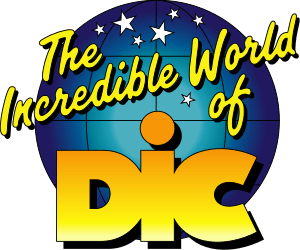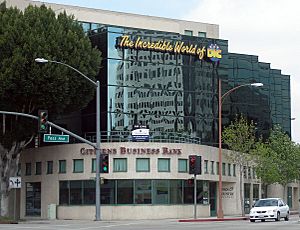DIC Entertainment facts for kids

Logo used from 1995 to 2001
|
|

Former DIC headquarters in Burbank, California
|
|
|
Formerly
|
|
|---|---|
| Public | |
| Traded as | AIM: DEKEq.L |
| Industry | Animation |
| Fate | Acquired by, merged with, and folded into Cookie Jar Group |
| Successors | Cookie Jar Group |
| Founded | 1971 |
| Founder | Jean Chalopin |
| Defunct | December 6, 2008 |
| Headquarters | Burbank, California, U.S. Former headquarters: Paris, France |
|
Key people
|
Andy Heyward (chairman and CEO) |
| Products | Children's television series |
| Parent |
|
| Divisions |
|
| Subsidiaries |
|
The DIC Entertainment Corporation was a company that made films and TV shows. It was best known for its animation studio. The company was also known as The Incredible World of DiC and had other names like DIC Audiovisuel and DIC Enterprises.
In 2008, another company called Cookie Jar Group bought DIC. Later, in 2012, WildBrain (which used to be DHX Media) bought Cookie Jar Group. This means WildBrain now owns most of the cartoons and shows that DIC Entertainment made.
Contents
History
Early Years: DIC Audiovisuel (1971–1982)
DIC was started in France in 1971 by Jean Chalopin. It was part of a bigger media company called Radio Television Luxembourg (RTL Group). At first, DIC mainly made TV shows.
In 1981, DIC teamed up with a Japanese animation studio called Tokyo Movie Shinsha. DIC helped animate some of TMS's shows, like the popular series Ulysses 31. They also worked on a pilot episode for a show called Lupin VIII. This partnership lasted until 1996.
Growing in the U.S. (1982–1986)
In 1982, DIC opened a U.S. office in Burbank, California. This office was called DIC Enterprises and was led by Andy Heyward. Its job was to make DIC's shows in English for American audiences.
DIC became known for making cartoons well and without spending too much money. Soon after starting, they created Inspector Gadget, which became a huge success. DIC also worked with toy companies to turn popular toys into animated series. This helped them get money and advertisers. Shows like Inspector Gadget, The Littles, and Heathcliff made DIC very successful.
In 1983, DIC opened its own animation studio in Japan. This helped them make their shows on their own. DIC also made deals with other companies to show their cartoons on TV and sell them on home video.
Moving to North America (1987–1993)
In 1987, Andy Heyward and some investors bought out the original owners of DIC. The company's main office then moved to the United States. After this, some of the original leaders, like Jean Chalopin, left DIC.
Jean Chalopin kept the original DIC offices in France and Japan. He started a new company called Créativité et Développement (C&D) to keep making cartoons.
After the buyout, DIC faced some money problems. They tried to get more projects by offering lower prices than other animation companies. This, along with overestimating how many kids' shows were needed, led to debt. DIC had to sell some rights to their shows to other companies to help with their finances.
Despite these challenges, DIC kept growing. They partnered with NBC and Coca-Cola to make and share TV shows. They also started making toys. DIC continued to make deals with different companies to distribute their shows. They also worked with international partners to create new animated content.
In 1993, DIC made a big deal with Buena Vista Home Video. This allowed Disney to distribute over 1,000 half-hours of DIC's animated shows. This deal helped DIC reach more homes and grow even bigger.
Partnerships and Disney (1993–2000)
In the early 1990s, DIC started a partnership with Capital Cities/ABC. They created a joint company called DIC Entertainment, L.P. This new company managed DIC's shows and helped share them around the world.
DIC kept expanding. In 1993, they started a multimedia unit called DIC Interactive. In 1994, they began making live-action TV shows too. DIC also worked with a Japanese company, Tsuburaya Productions, to turn their series Gridman the Hyper Agent into Superhuman Samurai Syber Squad.
In 1995, The Walt Disney Company announced it would buy Capital Cities/ABC, which included DIC. By 1996, DIC officially became part of The Walt Disney Company. DIC then worked closely with Disney, even making a deal to develop films for Walt Disney Pictures.
DIC also opened its own animation studio in France in 1997. They continued to expand into different markets and started a division to make direct-to-video movies.
Becoming Independent Again (2000–2004)
In September 2000, Andy Heyward, with help from investment companies, bought DIC back from The Walt Disney Company. This meant DIC could once again make shows on its own without Disney's rules.
In 2001, DIC planned to start selling its shows on home video again. They teamed up with Lions Gate Home Entertainment to distribute their products. DIC also tried to buy another company, Golden Books Family Entertainment, but decided it was too expensive.
In 2002, DIC bought a company that made products for young children called Mommy & Me.
In 2003, DIC launched three TV blocks for kids called DIC Kids Network. They also had a deal to make a show with POW! Entertainment called Stan Lee's Secret Super Six, but it never aired.
Public Company and Final Years (2004–2008)
In 2004, Andy Heyward took full control of DIC. In 2005, DIC became a public company, meaning its shares could be bought and sold on the London Stock Exchange.
In 2006, DIC got back the international rights to 20 of its shows from Disney. In the same month, DIC bought a company called Copyright Promotions Licensing Group (CPLG).
DIC also teamed up with AOL's KOL and CBS to create new Saturday morning cartoon blocks. These included KOL Secret Slumber Party (2006) and KEWLopolis (2007).
In 2007, DIC, Nelvana, and NBC Universal started an international children's TV channel called KidsCo. DIC also had a legal disagreement with the Dam company about their Trollz TV series, which was based on the popular troll dolls.
Merging with Cookie Jar Group (2008–2012)
In June 2008, DIC Entertainment and a Canadian company called Cookie Jar Group announced they would merge. The deal was completed in July 2008. DIC became a part of Cookie Jar's operations. DIC Entertainment Corporation was renamed Cookie Jar Entertainment (USA) Inc.
In 2012, DHX Media bought Cookie Jar Group. This meant DHX Media (now WildBrain) gained ownership of all the shows that DIC and Cookie Jar had made.
The DIC Kids Network changed its name to Cookie Jar Kids Network in 2009 and stopped airing in 2011. Cookie Jar also made the last season of Sushi Pack, one of DIC's final shows. KEWLopolis on CBS became Cookie Jar TV in 2009 and ended in 2013.
TV Show Blocks
DIC created many special blocks of shows for different TV stations in the United States.
Kideo TV
Kideo TV was a block of shows made by DIC and LBS Communications. It started airing in April 1986.
This block was 90 minutes long and included live-action parts with three cartoons from DIC's library. Shows like Rainbow Brite, Popples, and Ulysses 31 first appeared on Kideo TV. Later, The Get Along Gang and Lady Lovely Locks were added.
The "Kideo" name was also used for a line of VHS tapes that sold DIC cartoons.
Weekend Funday
Weekend Funday was another 90-minute block of shows from DIC. It aired on weekends starting in the fall of 1987. It was usually called Funday Sunday on Sundays. Sometimes, it aired on Saturdays as Funtastic Saturday.
This block featured many half-hour cartoons from DIC, including Sylvanian Families and Starcom: The U.S. Space Force.
Funtown
Funtown was a daily kids' show block on the CBN Family Channel. It started on September 11, 1989. It aired for many hours each week, including weekday mornings and weekend mornings and afternoons.
The shows on Funtown were a mix of cartoons, live-action shows, and shows that combined both. Some were made by DIC, and others were from different companies.
Dragon Club
Dragon Club (Chinese: 小神龙俱乐部 (Little Dragon Club)) was a daily TV block that aired in China. It started on September 19, 1994. It showed many DIC and ABC programs, along with other live-action and local shows.
After Disney bought Capital Cities/ABC, this block started showing Disney cartoons. It continued to air until early 2019.
Panda Club
Panda Club (Chinese: 熊猫俱乐部) was a shorter-lived sister block to Dragon Club. It started on October 2, 1994, and aired on fewer stations. Its shows were similar to Dragon Club's, and it ran until 1999.
Freddy's Firehouse
Freddy's Firehouse was a planned educational TV block for kids. It was announced in May 1998. The idea was for it to air on Pax TV on weekends, showing different programs from DIC's library.
However, Pax TV decided to make its own kids' block instead. So, "Freddy's Firehouse" never aired.
Other TV Blocks
- DiC Kids Network – Three blocks of educational kids' shows that started on September 1, 2003.
- KOL Secret Slumber Party – A three-hour block that started on September 16, 2006, with partner KOL (AOL's kids online).
- KEWLopolis – Launched on September 15, 2007, this block was a partnership with American Greetings.
Shows They Made
See also
 In Spanish: DIC Entertainment para niños
In Spanish: DIC Entertainment para niños
 | Janet Taylor Pickett |
 | Synthia Saint James |
 | Howardena Pindell |
 | Faith Ringgold |

